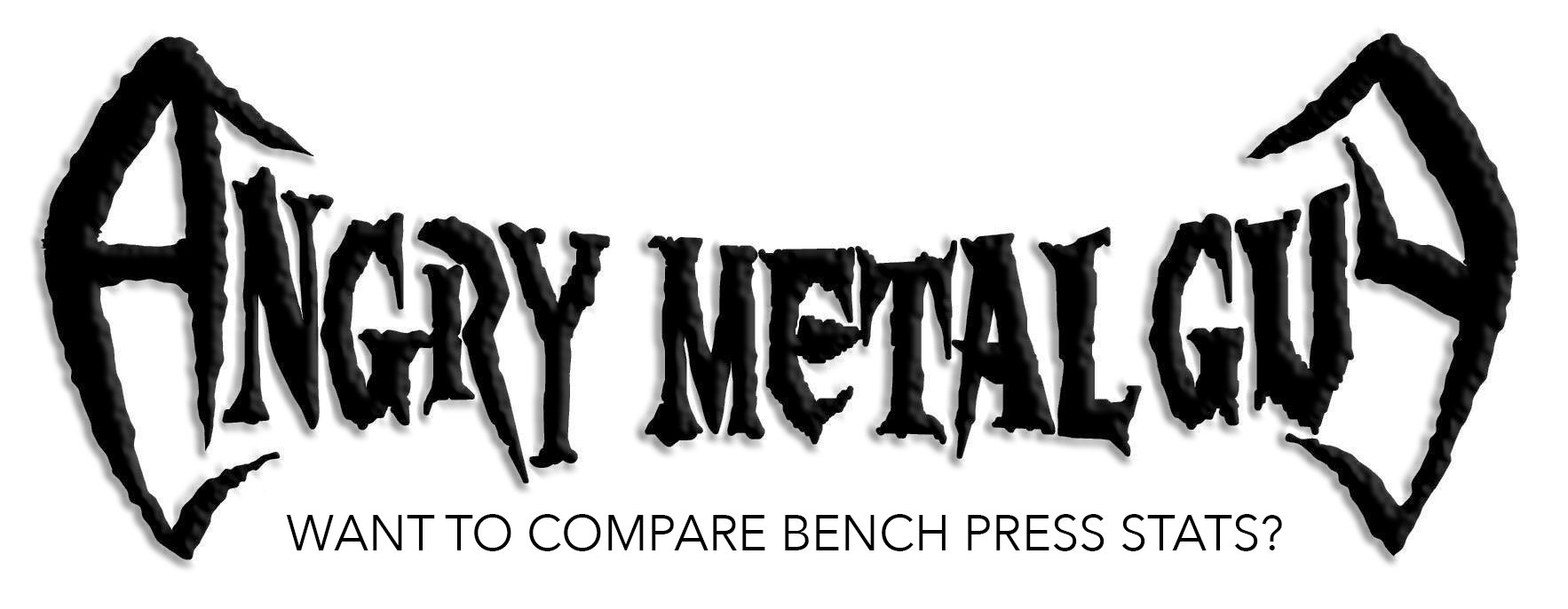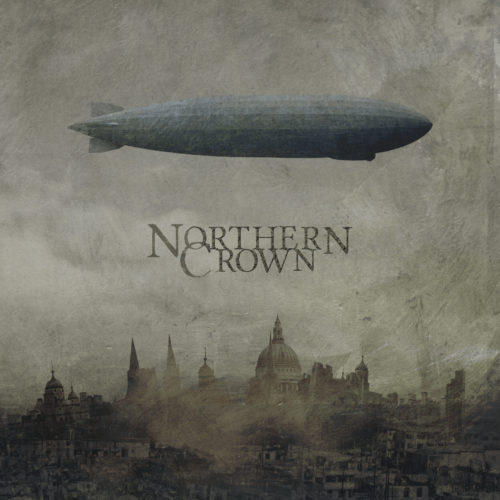 Once again, here we are. It’s been a minute since the previous installment of Angry Metal Guy’s Mental Health Awareness interviews, but I’ve got one more for you. Again, I want to thank Grymm and Master of Muppets for inviting me to participate in this endeavor, which seems ever more relevant in today’s absolute chaos. Between COVID-19 and people protesting COVID-19 (like a massively infectious virus would give half a shit about your precious facial freedom even if it could) and the absolutely justified unrest in the name of racial justice, we as humans need to be vigilant of our own mental stability now more than ever. Most of those efforts require each and every one of us committing to our own self-care, but that doesn’t mean we can’t collectively observe and address the issues we face and talk about what we all struggle with every day. It helps to know we aren’t alone, and that there is a safe place somewhere, at least, to share what we experience with someone. That’s part of what this whole series of interviews is about, and I hope that our efforts make our humble metal blog one of those cherished safe places.
Once again, here we are. It’s been a minute since the previous installment of Angry Metal Guy’s Mental Health Awareness interviews, but I’ve got one more for you. Again, I want to thank Grymm and Master of Muppets for inviting me to participate in this endeavor, which seems ever more relevant in today’s absolute chaos. Between COVID-19 and people protesting COVID-19 (like a massively infectious virus would give half a shit about your precious facial freedom even if it could) and the absolutely justified unrest in the name of racial justice, we as humans need to be vigilant of our own mental stability now more than ever. Most of those efforts require each and every one of us committing to our own self-care, but that doesn’t mean we can’t collectively observe and address the issues we face and talk about what we all struggle with every day. It helps to know we aren’t alone, and that there is a safe place somewhere, at least, to share what we experience with someone. That’s part of what this whole series of interviews is about, and I hope that our efforts make our humble metal blog one of those cherished safe places.
Today, I have a bit of a treat for you. Not only do I have a metric buttload of text for everyone, but I also bequeath upon you a full Zoom interview (edited amateurishly by yours truly) with my guest, Zach Randall, founder and guitarist of Northern Crown. I’ve transcribed a selection of excerpts from that interview, but we cover so much ground I highly encourage everyone to check out the clip. I want to extend a heartfelt “Thank you, fren!” to Zach for sticking around for just over two hours, talking about everything so honestly and freely. It was a highlight of my year, and I deeply appreciate his companionship. One final note before I dispense with this overlong introduction: everything—including segues unrelated to mental health awareness—in this interview is rooted in personal experiences recounted from memory, and does not constitute medical advice or instruction (always always always consult a professional as your first step when treating health matters, mental or otherwise). We just want to talk about the topic of mental health without feeling afraid that what we say isn’t worth saying, because it is. That’s the whole fucking point!
We weren’t expecting anybody to come to us to ask us to be a part of this interview, and when you did it was really cool because we were like, “oh man, so, people are actually reading these and had something to add!”
Yeah, you know, it’s one of those things where it’s… mental health in general is a topic that I’m passionate about. Obviously I have had my issues with it or else I wouldn’t be talking to you about it. In my 42 years I’ve learned quite a bit about it. On top of that, your site has a pretty big hand in what following my band does have. When The Others came out and Steel reviewed that, it was, like, immediate traction for the band. It was our second album, so nobody knew us and it made a big difference. It’s a combination of, I’m saying, “hey I have something to contribute,” and in that particular conversation you helped me out a lot.
I also want to just thank you for coming forward because that means that what we’re doing matters and that people are interested, and that if people have something to share we’re not going to tell them not to. That would be… backwards.
You have to destigmatize mental health stuff… you have to talk. The best way to destigmatize stuff is to talk about it, and I think that for so long the heavy metal, and to a lesser extent the rock world has been this very macho thing where you’re sort of… you know think about the whole Judas Priest chains and leather look that Manowar takes to a ridiculous degree. That’s been our genre for decades and you’re not supposed to talk about things, you’re not supposed to feel things. You can talk about depression but you talk do it in an angry screaming Pantera way, it’s like, no, let’s have a conversation about this stuff, dude.
Exactly. On that note, there’s a lot of people who, when you bring up the subject, they kind of shy away from it, either because they were brought up believing that they aren’t supposed to or that it’s taboo or something. But I think a lot of people also don’t really know how to talk about it. Like, they don’t know what to say, how to say it, when to say it, or even if it’s okay to say it. For you, at least, what was the thing that broke that wall for you?
Okay, so this will require some backstory. And there’s some early life stuff that I don’t think is required for this explanation. But really what it came down to was, I guess it was seven years ago now. I was married at the time. I was incredibly unhappy. I weighed about 300-320 pounds. I had a massive drinking problem, and my wife and I were both miserable. And I looked at myself in the mirror one morning and it was sort of like, “Okay, I don’t like who I am or who I am becoming, so I need to change this situation.” Step 1 was to get myself out of that relationship, get myself out of that house, but that wasn’t all of it. And since then, this sort of progression of I’m going to find a trustworthy therapist, and I joined a meditation group at a certain point. It started off as a combination of sort of survival techniques because there’s a lot of bad stuff happening and I need to turtle down and figure out how I’m going to get through this so that required talking to a professional about how I felt and then sort of looking inside and see what it is that I’m feeling and why I’m reacting that way. And then the final step was having some friends that I really really trusted that have spent some years getting to know and I knew they were good people and trustworthy, and confiding in them and telling them, “hey, something’s going on. I’m feeling this way, and reacting this way because of this.” And what that was is that my friends would understand what’s going on with me so they would know if I reacted strange to something, this is why, because there is something in my head that I cannot control, I can only control how I react to it. Also, you know, what I started realizing is when you say certain things, because maybe you have a thought in your head and you’re convinced about something in yourself or convinced that something bad is going to happen, and you say it out loud you realize, “Oh, yeah, that is kinda silly, nevermind.” So I started realizing there’s a lot of value in talking about it in that it helped my friends understand where I’m coming from and it built a better bond and it had a positive effect of me not staying stuck in my head. Saying stuff out loud takes some of the power away from it.
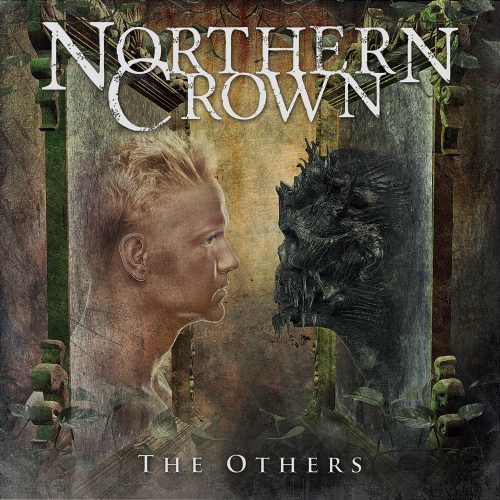
Since you brought up your friends there, when you and your bandmates write music, how do you bring your relative experiences together to form songs that really speak to you or that you hope will speak to other people who listen to them?
Yeah, so there’s two parts to that. Part of that is, musically I just sort of write what I want to hear when I don’t necessary think someone is making exactly the way I am. I’m like okay, if I like this, somebody else probably does. Lyrically, you know when the band started I wrote all the lyrics, and now there’s probably a 70/30 or 60/40 split between me and Frank. When you hear advice when people are aspiring novelists or short writers, the advice is write what you know. So, for me it’s been living my life and sharing the stories of my life, albeit in a dramatic, overwrought, doom-metal way. You could probably write some overdone story about going to the store to get milk in a doom song and nobody would know what it was about. You gotta play it up a little bit. In metal in general, but especially for us it gives you a big template to take something that happened in your life. It’s been a lot of relationship stuff. There’s definitely been at least one relationship song on every album, or maybe I’ll take a moment in time where I had a really intense feeling about something, and break that back down and sort of turn that into a story, and it’s sort of writing what I feel in a somewhat eloquent but still musical manner. In terms of how it resonates with people, I mean, I write what I write and it seems like there are some people that it resonates with, but, and I don’t want this to sound arrogant when I say this, but at the end of the day there are three people that it matters how it resonates and that’s myself, Frank and Leona1. That’s the audience I’m trying to please. I do want people to like it, I do want it to resonate, but at the end of the day, we aren’t a signed band. I do this with my time and my money, and we do things in a really professional way, so when it’s said and done I have to feel good about the riffs that I play or the words that I write and the stories that I tell in my records. But I think being genuine, I think being honest, will always resonate with people. If you are prone to this sort of music and want to pick up the lyrics and read along with what it is we’re talking about, I think as human beings we are more similar than we are different. Just by the process of making honest music and not shying away from my feelings or from the dark stuff, I just think that I’m opening myself up to the world and that’s something that will naturally connect with people.
Yeah I definitely agree that, when I hear a band release material that feels like it comes from the heart, when it feels like what they created mattered to them, even if it’s something that’s supposed to be funny or supposed to be kind of kitchy or whatever, you can still make it impactful.
I think I’ve made a half-dozen albums at this point, you know, stuff that I’ve produced myself. That’s one of the reasons I’m doing this, I wanted to be a record producer. One of the things that I’ve learned is that you can tell when a band is having fun and, again, we do the sort of tough, serious exterior in heavy metal for the most part. There are obviously bands that are intentionally funny, but… dude, making records is fun, and you can be doing this really serious, dark music about a heavy topic, and, honestly dude, like, I’m literally sitting in my home studio right now and it gets silly as fuck in this room. It really, really does, and it’s because we’re having fun. That’s sort of where the genuineness comes from, because you’re not trying to be anything other than yourself and you’re doing something cool with your friends. I mean, does life get better than that? I don’t think it does, and that will shine through in terms of enthusiasm and passion and quality of performance. So, to bring it back to your question I think doing what I do with passion, I think will, so long as I have my head on straight and I’m making the best album I can, I think on some level that will always resonate with people.
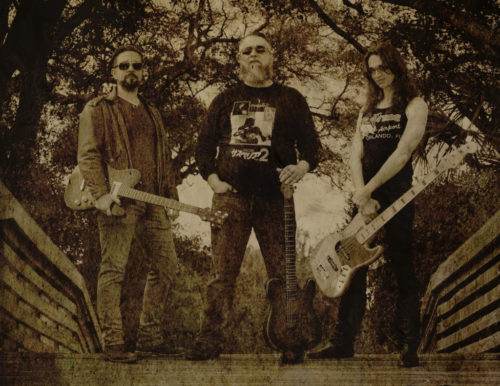
People don’t really think that, whether you are really having a tough time because everything around you is really tough, or you’re just suffering from mental illness all the time and so you have to constantly battle all those demons, or if you are going through some other third thing, I feel most people tend to think that they got stuck in a really unique situation. That nobody else would be able to identify with or empathize with it, and that’s why they never talk about it. But there are 7.8 billion people on the planet so the odds that you’re the only one going through this particular thing is infinitesimal. So opening up really shows how many people can identify, and that’s an important part of the mental health discussion. To show the people who are afraid to talk that there are a million billion people who are also afraid to talk, and that’s in and of itself a reason to talk.
We’re more similar than we are different, and it’s really really easy to forget that. Here’s the thing. Sort of that notion of, “I’m the only person going through something.” I go through that, of course, everybody goes through that. I think there are a couple of things going on there. First of all, we don’t want to talk about it and if you don’t talk about it you don’t know if other people feel the same way. And the other thing is that slick, glossy image that social media present to us of what other people’s lives are like. I’ve certainly been guilty of this in the past of me posting “look at how awesome my life is” and happy relationship pictures or whatever. If you see me doing otherwise feel free to call me out in the future, but I’ve sort of made a vow to not do that. I post cat pictures and guitar pictures on Facebook now and I share funny memes. And I’m on there to stay in touch with friends and family. That’s how I stay in touch with them. I see so much stuff, just going through my Facebook feed, from people that I know well enough and I see what they’re posting and I’m like, “yeah that’s not really what’s going on,” because I know them well enough to know that there’s other stuff happening and it’s irresponsible. It’s not like you can’t post pictures of yourself happy and it’s fine. It’s irresponsible I think to present a false narrative of yourself. And I’m not saying it’s malicious when you do it, because you actually may be doing this to make yourself feel good. The reality is our actions affect everybody, especially because we’re so connected. Even, like, compared to ten years ago, it’s completely different how we’re connected. I don’t think it’s an inherently bad thing, I know that some people do. I think it has some really bad side effects. One of those is that false glossy image on Facebook and my life is fucking shit. No dude. It’s not. That’s not the way it is. There’s somebody that’s posting happy stuff in a constant stream, but no, they might be actually fucking miserable, and this is their way of coping with it. But I think it’s good to be aware of what you are sharing and how that might be received. We’ve already established that people don’t like to talk about the way that they are feeling about some of this mental health stuff, so you may not know that somebody you care about very much is struggling with something, and then you post something very polished and that might affect somebody really badly. You don’t really mean to, but think about what you’re presenting to the world. We present everything to the world now. That affects people. It affects somebody you care about. So there’s two sides of it. We’re prone to not talk about it, and then everybody presents this picture of, “look at my fucking awesome life.”
I feel like, lately, especially with all of this time that people have at home to just research stuff because they’re bored, of all things, the metal community spends a lot of time focusing on bands with people who suffer from mental illness or who do really terrible things to other people and how awful it is that it’s always happening, that they’re always finding a new one. But there’s the opposite side of that coin and I don’t think enough people are talking about that. Because you have artists like this one frontwoman—I can’t remember her name or the band she’s in, —who is schizophrenic, but she manages to tour all the time, and she manages to still see a therapist, and she manages to be a fruitful member of her band and she is a reportedly still going. I don’t know if you know who I’m talking about, and I know there are more artists like her.
It’s always easier to talk about bad stuff. I don’t know that anybody would watch the news if it was all… actually you know what I would watch the news if it was all good news. I think that it’s easier to talk about scandalous stuff because then you can be righteous and have a moral outrage about it. If don’t know if that’s a human thing or a cultural thing or whatever. I actually didn’t know about this band and I’m just learning, and we should celebrate artists like that. You know, I was at ProgPower this last year and Psychotic Waltz played, you know, their one guitar player is in a wheelchair. Fuck, dude, you know that cannot be easy! Never mind sitting there and playing, okay, that’s one thing. On a side note, I sit in this very chair for hours on end working on music, and sitting down while having a guitar or bass on destroys your fucking back it’s so bad, but then trying to travel and carrying your gear and trying to get everything set up. There are so many things involved that becomes immensely difficult for this guy and he’s still out there playing. They put on an amazing fucking set, so I mean maybe we should be… we can’t expect anybody else to do it, maybe some of us have to individually lift these people up and maybe it’s something that’ll grow. If you’re telling me… I’m telling you this guy is in a wheelchair and you’re telling me there’s a diagnosed schizophrenic that’s still out there being a productive artists, dude, that’s great stuff to talk about. I’d rather talk about that than the guy from As I Lay Dying trying to get his wife killed, you know?
Exactly, because, you know, the negative stuff only furthers the stereotype that mental illness destroys people, in that you can’t talk to anybody because all anybody will ever see is your mental illness or what’s wrong with you. They won’t talk to you, they’ll ostracize and exile and all that other kind of stuff, but it’s not like that. At all. It’s just this weird, twisted version of reality that people make up because there are too many examples of that being publicized so heavily.
Specifically talking about musicians, we have a really weird view of musicians, in the US anyway, in that it’s sort of very attractive and desirable. Part of that is the whole rockstar part of it, but at the same time there’s this sort of suspicious glance that, like, rock and metal musicians have and I think it’s a lot better than it used to be, but I remember in college I’d walk around with my long hair and my Ozzy and Slayer shirt on and people were aggressively nasty to me. And it’s just sort of that view of what somebody who listens to heavy metal is, and that thankfully has changed substantially because when you have a band like Metallica becoming so mainstream or you have Iron Maiden being gigantic, literally every place in the planet. I mean, there are probably penguins in Antarctica with Iron Maiden shirts on! It normalizes it, and even like death metal has become kind of normalized, you start to hear screaming in very mainstream music. In our Slack for work, you’ll see people using the horns emoji, or just people casually referring to something as being “really fucking metal” and you know the person has never listened to metal in their lives. It’s become very normalized at this point, but there’s still a suspicious glance on what sort of person a metal musician in general is. There was a woman I dated maybe, like five years ago. One of the first conversations was, “I know you’re in a band, so you’re probably used to girls just throwing it at you, but I’m not like that.” I’m like, I’ve been playing music for a long time and I’ve never had a girl “throw it at me” just because I was in a band. It’s not being in a band, it’s being famous is what it is.
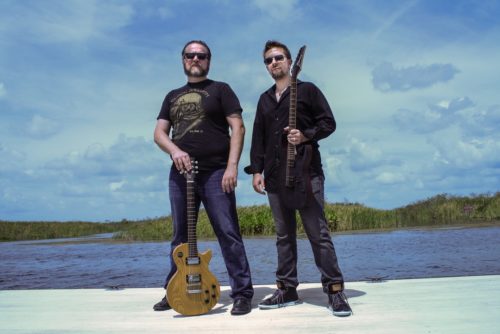
Yeah, exactly. And, you know, that’s not always the thing that people want, either. A lot of these bands just want to make music, that’s what’s important to them.
I actually haven’t played live since 2016, and that’s because my band is sort of scattered, but it’s by choice. I stopped enjoying gigging quite a bit. I’ve got my little home studio here, and my guitar collection and I make music, you know? I actually have taken advantage of the pandemic. I’ve been writing a ridiculous amount of music lately. I just formed a side project very very recently. It won’t be released until this fall because I gotta give the Northern Crown room to breathe. Sort of started out as a stoner thing, just me curious to see if I could get a stoner guitar sound, but it’s sort of shifted more towards old school doom and Candlemass. Yeah, I’ve got a whole album written, and I’m getting musicians to record their parts, and it’s like, that’s what I like to do. Nobody will probably ever hear these songs live and that’s fine, but I’m making and releasing a record. I’ve got a melodic death metal project that I started three years ago, and I’m like, “well, fuck, I have time to finish that now!” That’s what I like to do.
That actually brings me to the current events question. There are a lot of people who are stuck at home, obviously, with this quarantine thing and the more info that comes out the more it seems like the lockdowns is going to be going on for a long time.
I hear in Florida they’re talking about opening things up, and it’s like whatever. I could see this lasting a couple of years. I really could, but hopefully not.
Yeah, and you know that affects people who have to deal with a lot of mentally harrowing stuff. They are stuck at home, which, in a lot of people’s minds, their ability to find help and to seek treatment has now been handicapped. But there are a lot of resources out there, I think still.
Speaking about mental health resources during this, my therapist is in his 70s. I actually went into his office, and I had an extra webcam and I set it up on his computer, and taught him to use Skype and Zoom, and I was like, “yeah, doc, I’m not seeing you again in person until this is done.” And now he’s doing sessions remotely. There are absolutely options for people out there, thankfully, and I also think it’s really important to do Zoom hangouts. Like, I have a lady friend that I take on virtual dates, and it’s done sitting right in this chair. My best friends, we do virtual hangouts. I think we are fortunate in that—not all of us, because some people don’t have the same resources, so I don’t wanna make everybody live their life the way I do—but, we have such ridiculously powerful technology at our hands. So, life is not ideal at all right now, however, there are a lot of things that we can do to help stave off some of the social isolation that we might be dealing with otherwise. Thereby, we give a little bit of improvement to your mental health.
Yeah, because you can’t just quit your self care because the world is trying to deal with a virus. You can’t let that stop you. You have to keep going, you have to keep working on it. And that’s why it’s important to know that there’s still plenty of ways to accomplish that. There’s still ways to practice self-care. You have to socialize, you have to find some way, if you need it, to access therapy and all that other stuff. The fact that we are doing this interview this way right now is evidence to the fact that it’s possible.
I like that you were just using the phrase self-care, by the way. That’s a phrase that I don’t know that I’ve ever heard until I saw a therapist. Again, I don’t wanna assume my experiences are global, but I don’t know that it’s a phrase I’ve heard a lot. I think the notions of self-care and self-compassion are something that I think need to be spread out generally a little bit more. I think, if everybody made more of an effort to exercise self-care and self-compassion, I think the world would become a markedly better place very quickly.
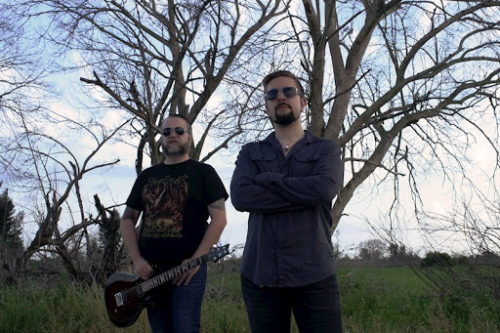
Yes, and you know, the hardest part for me—because until I met my roommate who told me about self-care, I didn’t do self-care. I was satisfied to go to my psychiatrist and just say what I needed to say there and then that would be it, which obviously is not enough. And then, my roommate told me about the concept of self-care just ambiently during normal conversation, and slowly over time and with effort, I realized just how important it is because that means, you know, you’re working but you’re in the middle of a panic attack. Self-care is getting out of there, you know, making sure that you have a way out. You don’t want to be at work with a panic attack on your plate, you know, it’s not right. You have to learn how to say, “I can’t be here right now. I have to take time for myself. I’ll be back tomorrow.”
That’s been an important thing for me about being self-employed and doing consulting, so that my schedule is very flexible so that when I need to have a mental health day or a self-care day, I’m able to do so. I need to take care of my responsibilities. It’s honestly been super valuable. A whole other personal philosophy of sitting at a desk for eight hours because reasons is not—I’m sort of opposed to having a job like that anyway, but then having issues with depression and anxiety and sometimes I just need to not be around people, period. It’s really important for me to be able to do that and still earn a living.
Right. I think that at least in America that the most difficult part of it is our sociopolitical climate, I guess, hasn’t evolved to the point where being comfortable setting that boundary where you know that you need to be separate from your profession or your social circle for a minute… it’s not really mainstream yet. Jobs still don’t support that kind of stuff. There are plenty of companies that do but still way too many that don’t. Eventually we will work our way to there, but it’s important for people to start getting comfortable with it now.
So I think I’m gonna ask one more question and then I guess I’ll let you go. I had one more question in my book, which I tossed it like an hour and a half ago—I didn’t need it anymore. But, the last question is one I always try to ask everyone in this series. Have you ever had anybody reach out to you and express how touched by your music? Have you ever had an instance where somebody was like, “wow, this was special to me and I wanna thank the people who made it?”
So, on our first album In the Hands of the Betrayer there’s a song called “To Give an Orchid.” I had actually started writing that song in the early 2000s and it sort of evolved over time and it was a sort of demo in a couple different bands that never got release, and I finally released it with Northern Crown. I would do it differently now, and I actually may re-record it sometime in the next year, but Frank has a really good vocal performance. I really like a lot of the lyrics and there’s cool instrumentation in there. But I had somebody email me once and said that it was him and his girlfriend or his wife and they were driving around listening to it on a CD, and after it was over they just sort of sat in silence, jaws on the floor, looked over at each other, and the guy’s wife said, “I wanna make babies to that song!”
That’s awesome! That’s a cool reaction to get!
It is! Unfortunately, since we don’t play live I don’t get the sort of… you know, we get reviewed and we have people reach out. It would be nice to have some more fan interaction than what I get right now, though. That would be cool. Maybe that will happen now that we’re stuck at home, but ultimately I make this music for an audience of three, but if there’s people out there that it’s impacting them positively in some way or if they’re just banging their head to a riff I wrote, that’s something that I’d like to know.
Well, it’s been a blast talking to you! I’m very excited for everyone at the site to get to read this interview! I just want to thank you again for your time to hang out with me, and by extension the AMG crew and stuff.
I’m glad to do so. It was a good time.
Agreed! So I guess just stay healthy, and keep your head up during these trying times, and be well!
Thank you, same to you. Peace out, homie!
Editor’s Note: Northern Crown’s latest album was released July 3rd and the review can be found here.
